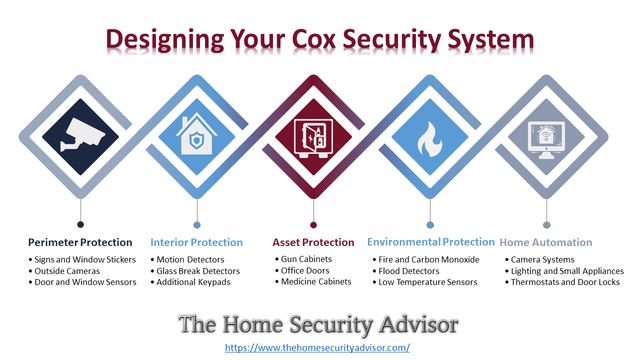Designing a Cox Homelife Security System
https://www.thehomesecurityadvisor.com/cox-home-security-reviews/
Perimeter Protection – The first objective when configuring your Cox Security system is how to protect the perimeter of your property. In addition to mounting door contacts on the doors and any vulnerable windows, you want to discourage any potential burglars from targeting your home. Position yard signs, window stickers and outdoor Cox Homelife cameras where they are readily visible.
Interior Protection – Your Cox Security system should also include a second line of defense that enables you to detect an intruder if they are able to gain entry to the home. Cox motion detectors can be installed to protect larger areas and in centralized hallways. You might want to consider an extra keypad in the master bedroom, as well. Indoor Cox Security cameras can be monitored on some keypads and it will also let you activate panic alerts more easily.
Asset Protection- Your Cox Alarm system also lets you configure certain sensors as “non-reporting. If they are set up properly, they will not set off the siren or send a signal to the monitoring center. Instead, they will only notify you discreetly through your Cox Homelife App. Many Cox Alarm customers use sensors on gun cabinets, medicine or liquor cabinets or office doors.
Environmental Protection – Your Cox Home Security system can also be set up to monitor environmental hazards such as fire, carbon monoxide, flooding or freezing. There are specific Cox Alarm sensors for each of these applications.
Home Automation- Cox Home Security systems can serve as the central hub to control lighting, cameras, heat and air conditioning, doors and garage door openers. Cox Security systems can control virtually any home automation function right from your smartphone on the Cox Homelife App.
